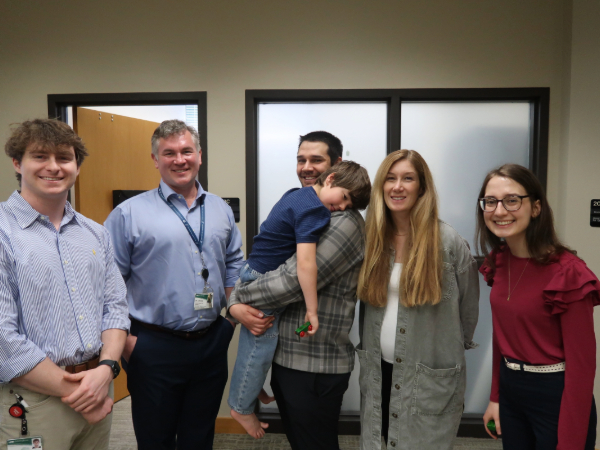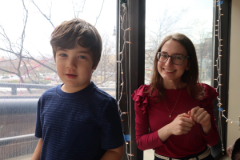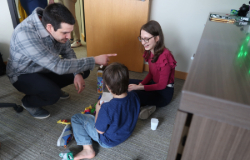 From left: Nathaniel Fehrmann, M.S., Andrew Crouse, Ph.D., The Miner Family, and Aleksandra Foksinska, M.S.For one family, a difficult genetic diagnosis sparked a mission. With help from the University of Alabama at Birmingham (UAB) Hugh Kaul Precision Medicine Institute (PMI), they’re now turning their journey into hope for families worldwide.
From left: Nathaniel Fehrmann, M.S., Andrew Crouse, Ph.D., The Miner Family, and Aleksandra Foksinska, M.S.For one family, a difficult genetic diagnosis sparked a mission. With help from the University of Alabama at Birmingham (UAB) Hugh Kaul Precision Medicine Institute (PMI), they’re now turning their journey into hope for families worldwide.
The Miner family’s journey began when their son James, now four, had his first seizure at just five months old. What followed was a whirlwind of hospital stays, MRIs, EEGs, and specialist visits. Eventually, James was diagnosed with epilepsy, yet his parents still had more questions than answers. After pursuing genetic testing, they learned he carried a rare mutation in the YWHAG gene, known to cause seizures and developmental delays. With no known cure and little existing research, the diagnosis felt overwhelming, but it sparked a determination to seek answers not only for James but for other families facing the same unknowns.
In 2022, PMI connected with the Miner family behind the YWHAG Research Foundation, which supports children with YWHAG gene mutations—an ultra-rare neurological disorder linked to seizures, developmental delay, and other challenges. The family's connection to PMI came through a referral from another rare disease organization.
“PMI helped form the basis for our entire foundation,” said Andrew and Meagan Miner, James’ parents. “The team made diagrams and summaries that allowed us to actually understand what was happening. That helped us explain things to doctors, apply for grants, and, most importantly, connect with other families.”
Though PMI’s AI-powered drug repurposing analysis did not identify immediate treatment options, the information uncovered by PMI analyst, Elaina Solano, now a medical student at the UAB Marnix E. Heersink School of Medicine, became the foundation for something even more impactful —a customized “family report” that became the foundation for the family's advocacy website. The report helped demystify their son’s condition through accessible visuals and clear language—resources the family said were otherwise nonexistent.
“At the Hugh Kaul Precision Medicine Institute, we’ve learned that when complex genomic data are distilled into clear, customized reports, families shift from being observers of research to becoming its co‑pilots—accelerating every step toward a cure,” said Matt Might, Ph.D., director of PMI. “Watching the YWHAG community turn newfound knowledge into an energetic advocacy movement reminds us that accessible science isn’t just information, it’s empowerment.”
That determination led to the creation of the YWHAG Research Foundation, which now connects families across the globe, provides accessible information, and partners with researchers in search of a cure. The foundation aims to build community and raise awareness about YWHAG-related conditions while equipping families with the latest resources, from medical research updates to potential therapies. Through advocacy, education, and scientific collaboration, they are building something rare: hope. As genetic testing becomes more common, the foundation expects to grow, and they want every newly diagnosed family to feel less alone than they once did.
 “One of the greatest privileges of my job is connecting with families navigating rare and ultra-rare diseases,” said Aleksandra Foksinska, program manager and key member of PMI’s leadership team. “Rare disease is isolating enough as it is, but having even someone or some people to lean on, especially at the beginning, can make a world of difference. At PMI, even when we can’t offer a treatment strategy or drug repurposing option, our goal is to walk alongside families by sharing what we, the biomedical science community, do know.”
“One of the greatest privileges of my job is connecting with families navigating rare and ultra-rare diseases,” said Aleksandra Foksinska, program manager and key member of PMI’s leadership team. “Rare disease is isolating enough as it is, but having even someone or some people to lean on, especially at the beginning, can make a world of difference. At PMI, even when we can’t offer a treatment strategy or drug repurposing option, our goal is to walk alongside families by sharing what we, the biomedical science community, do know.”
They added that support from PMI leaders like Foksinska and Might made a lasting difference.
“We could reach out with questions, bounce around ideas, and they always took the time to help,” the Miners said. “Everyone has been so friendly, so helpful. It’s been incredibly encouraging.”
Since launching their website, the family has connected with other researchers and families around the world. Their son’s story—and the resources built with UAB’s help—now appear in global grant applications and guide physicians unfamiliar with the rare condition.
In 2024, the family was introduced to Joao Pereira, Ph.D., a faculty member who had just joined UAB’s Department of Neurology. That connection is opening new possibilities for collaboration between the foundation and UAB.
“To people affected by rare neurological diseases, the starting position is often one of hopelessness,” explained Pereira. “Upon diagnosis, they often find that little to no research is being performed on ‘their’ disease because of the difficulty in obtaining resources to study a disease that targets a small proportion of the population.”
PMI is now exploring additional research opportunities with the Pereira Lab. Earlier this year, a postdoctoral researcher from the lab, Anna Maria Schreiber, Ph.D., presented findings at UAB’s Rare Disease Symposium.
“Partnerships such as the ones promoted by UAB’s Precision Medicine Institute enable us to maximize what we can do by gathering resources and facilitating cross-departmental cooperation, even with limited resources,” said Pereira. “For people with little hope, we can show that we care and are dedicated to addressing the underlying causes and potentially design new therapeutic approaches to their condition.”
 PMI continues to offer tailored support for patients and families navigating rare and complex conditions. That support often includes genetic research, data visualization, educational tools, and connections to scientific and clinical communities.
PMI continues to offer tailored support for patients and families navigating rare and complex conditions. That support often includes genetic research, data visualization, educational tools, and connections to scientific and clinical communities.
“Families like the Miners embody the reason our program exists,” said Foksinska. “They’re incredibly proactive and passionate, and seeing how they take scientific insights and turn them into action inspires me and fuels my motivation to keep doing what I do.”
For the family, the collaboration with UAB has brought clarity, confidence, and a global ripple effect.
“Our only regret is that we didn’t find UAB sooner,” said the Miners. “But now, thanks to everything PMI helped us build, other parents will.”